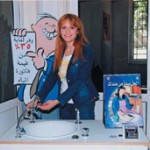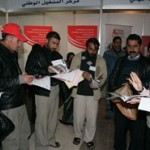
Although Jordan’s domestic water use rate of just under 21 gallons per person per day is among the lowest in the world, water resources are scarce in the region, making it a constant challenge for the government to supply this basic necessity to its people.

The cornerstone of Family Guidance and Awareness Center is a free hotline, staffed by trained counselors, that receives more than 120 calls a month with questions on law, psychological issues, employment, and other topics.

“Accuracy” and “expediency” are the benefits that the court staff in the northern Jordanian city of Jerash name in using a computerized case processing software developed with USAID funding. “The new system has improved the speed and precision of doing the work. Preparing 20 notifications used to take up to two hours.

To prosper, Jordan must optimize the use of all available water resources. To this end, the country is capturing water from brackish streams that would otherwise go unused, and delivering 125,000 cubic meters (4.4 million cubic feet) of water a day to a USAID-funded water treatment plant.

Jordan is at a critical stage in providing enough quality jobs for its fast-growing workforce. Jordanians also face fierce competition from foreign workers in labor intensive sectors, leaving many Jordanians unemployed and unable to support their families.








Comment
Make a general inquiry or suggest an improvement.